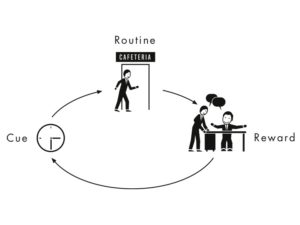Sales Tax Institute Book Club: The Power of Habit by Charles Duhigg
Are you aware of the extent to which habits control your life every single day? Habits have the power to run our lives without us even noticing at times. This quarter, the Sales Tax Institute book club read The Power of Habit: Why We Do What We Do in Life and Business to find out all about it. Author Charles Duhigg, who is also a New York Times reporter, dives into the science behind habit creation and reformation and provides tips and tricks to setting your habits straight individually and for organizations.
Here are the highlights of what we learned…
Setting Habits for Ourselves
To start, you need to know the components of a habit.
Habits consist of a cue, routine, and reward. The cue triggers you to act on the routine because you seek the reward that follows.
In this example, a man notices on the clock that it is the afternoon (the cue), so he goes to the cafeteria (the routine) to get a cookie knowing he gets to chat with his friend and take a break (the reward). Do you have a similar afternoon habit?
Habits are neither inherently bad nor inherently good. This depends on each individual habit. For example, alcoholics get into the habit of drinking every evening while a fitness guru might get in the habit of working out every morning. When reflecting on your own habits, you can evaluate if they are benefiting or taking away from your life.
You may be wondering now, how can you get rid of a habit that’s not beneficial to you?
The truth is, completely tossing away a habit is a huge challenge, and it often results in failure. Instead, you should focus on changing your habit. To change a habit, you can keep the cue and reward the same, but change the routine associated with it.
For example, if you are in the habit of eating a cookie every afternoon as an excuse for a social break at work, you may have gained a few extra pounds. How can you rework this habit to still get the same reward (a break with friends) without indulging in the cookie when your afternoon craving hits? The key is changing the routine. Instead of heading to the cafeteria, walk over to a friend’s desk to chat. This is a simple example, but you can use this strategy in reshaping your habits to benefit your life the most. You just need to know what the true reward is that you are seeking, which sometimes can take some digging.

Setting Habits for Our Organizations
Now that we have a background on setting up our habits to benefit our lives, how can we optimize our habits to benefit our organizations?
Once you’ve reflected on your habits and found ways to make them contribute to your life, you can begin to check in about how they affect your productivity, efficiency, and overall success at work. Is there some little tweak that can become part of your habits that sets yourself up for more success at work?
This is where the idea of “keystone habits” comes in handy. A keystone habit consists of the routines and practices by which someone operates, without any need for willpower or persuasion. They are ingrained. In personal life, this could include things like making your bed and brushing your teeth. However, in the workplace, keystone habits can be used strategically to save time and effort.
Some examples of keystone habits at work include:
- Time blocking
- Meeting agendas
- Effective emailing
- Delegating tasks
- Cross training
- Upholding values
When activities such as these become established processes at work, more time can be spent on work that actually generates revenue for your company. Keystone habits that create efficiencies can permeate company culture over time.
Here are a few articles to help you create better organizational habits:
- How organizations can build healthy employee habits
- How to Improve Organizational Skills at Work
- How To Create Organization Habits That You’ll Actually Stick To

How We’re Improving Our Habits
At the Sales Tax Institute, we have been growing a lot over the last year. We’ve grown in terms of staff, clients, and professional development. All of this growth has motivated us to be more intentional in our daily habits. We have been establishing processes to help our team work efficiently and provide for as many clients and students as possible without diminishing the quality of our offerings.
Our team has committed to creating new habits such as writing procedure guides to share knowledge across roles and cross-train, communicating the most effective way for each situation, keeping up with our physical and mental health, and more.
How can you and your team grow through the power of habits?
If you’ve read The Power of Habit and have thoughts or insights, we’d love to hear! Email us here.
Next, the Sales Tax Institute will read Red Notice by Bill Browder. We’d love to have you join us in our next reading assignment. We encourage you to support your independent local bookstores. Our neighborhood bookstore is Sandmeyer’s Bookstore in historic Printer’s Row Chicago. Join us and support your own favorite local store!
